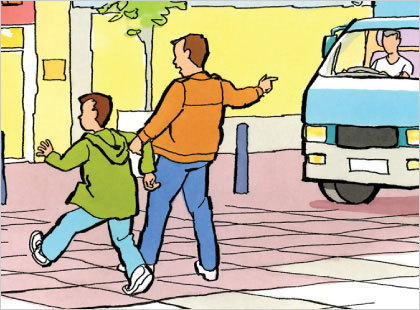The internet is a great way to communicate. However, it is also easy to make mistakes in your messages. Being well aware about some simple things for sending and receiving emails can prove to be beneficial. Read about some internet etiquette tips for you and your child. Email is the most preferred form of communication nowadays. It is fast and easy to use. Besides emails, cyber communication also involves web posts and bulletin boards. While cyber communication is convenient, it also has a lot of potential for misunderstandings. At the same time when children are involved in such things the risk is higher. It is therefore essential to teachchildren about basic internet etiquette. Read out the following points to your child so that he or she is aware about using emails safely. In this articleHelp your child in sending messages to the right peopleTeach your child how to avoid sending junk emailsMake your child aware about how to avoid controversiesHelp your child in sending messages to the right people How many times have you heard of people sending a message or email to someone and then discovering it has gone to another person? Sending a mail to the wrong person is one of the biggest net blunders you can make. A large number of mistakes happen because the sender is too hasty. Before you send out an email or message, use a basic checklist. Are you sending it to the right person? Check the screen name or email address. Check for spelling mistakes in the address and message body. Generally, when you receive an email from someone, save his email address in your address book. Then when you have to reply to the person in the future, you can select the address directly and do not have to type it out. In addition, keep track of changing email addresses. Many people, especially children and teenagers, keep changing their email addresses as a fashion. Others forget their passwords and have no other choice but to create a new address. Teach your child how to avoid sending junk emails Everyone does not have the time to read more than 10 emails or messages a day. Therefore, do not waste yours and other peoples time by sending junk information. This includes jokes, chain letters, other forwards, etc. While some people enjoy receiving this kind of mail, many people do not. Before you go ahead and forward that joke, check which group your recipient falls in. Another category of emails to avoid sending is unconfirmed reports. Many rumours and cyber hoaxes begin simply because one person sent it to his entire friends list without checking if it is true. Remember there are many mischief-makers in the cyber world whose sole purpose is to spread fear through malicious lies. As far as possible, avoid sending attachments unless you have been requested to do so. This is especially true if you are contacting someone for the first time. Due to virus threats, many people simply delete messages containing attachments. If the recipient does not know you, your attachment will suffer the same fate. If you are sending a photo or document, see if you can include it in the message itself rather than as a separate attachment. If you must send an attachment, make sure it is labelled properly. An attachment labelled guest list for party is more likely to be opened than one titled document 1. Make your child aware about how to avoid controversies An online persona may offer you anonymity but that does not mean you can do whatever you want with it. When you are chatting on a bulletin board or in a chat group, avoid discussing controversial topics. These include religion, politics, sex, race, gender-related issues, etc. You never know when your comments might hurt someone elses sentiments. Similarly, take care when conversing with people from other countries and cultures. Do not criticise their beliefs or customs. If you are unsure about how things work in their country, ask for an explanation. People will be very happy to provide an explanation. This way, you can also improve your general knowledge. If you say something insensitive, apologise immediately. If someone says he was offended by what you said, tell him you are sorry and it will not happen again. If you are the injured party, write to the person and politely explain why his comments hurt you. Do not force someone to apologise. In most cases, people who have inadvertently been offensive will apologise and correct their behaviour. Always strive for clarity in your communications. It will minimise potential misunderstandings. In addition, caution is an important virtue that is part of good cyber manners. Telling your teenage child about all these things will help you to ensure that he or she is using internet and emails safely. Making children aware about the hazards beforehand helps to avoid complication in future. Such steps in protecting children from external harms make it easier to walk on thin line of parenting.
The internet is a great way to communicate. However, it is also easy to make mistakes in your messages. Being well aware about some simple things for sending and receiving emails can prove to be beneficial. Read about some internet etiquette tips for you and your child. Email is the most preferred form of communication nowadays. It is fast and easy to use. Besides emails, cyber communication also involves web posts and bulletin boards. While cyber communication is convenient, it also has a lot of potential for misunderstandings. At the same time when
children are involved in such things the risk is higher. It is therefore essential to teachchildren about basic
internet etiquette. Read out the following points to your child so that he or she is aware about using emails safely.
Help your child in sending messages to the right people
How many times have you heard of people sending a message or
email to someone and then discovering it has gone to another person? Sending a mail to the wrong person is one of the biggest net blunders you can make. A large number of mistakes happen because the sender is too hasty.
Before you send out an email or message, use a basic checklist. Are you sending it to the right person? Check the screen name or email address. Check for spelling mistakes in the address and message body. Generally, when you receive an email from someone, save his email address in your address book. Then when you have to reply to the person in the future, you can select the address directly and do not have to type it out.
In addition, keep track of changing email addresses. Many people, especially children and teenagers, keep changing their email addresses as a fashion. Others forget their passwords and have no other choice but to create a new address.
Teach your child how to avoid sending junk emails
Everyone does not have the time to read more than 10 emails or messages a day. Therefore, do not waste yours and other people's time by sending junk information. This includes jokes, chain letters, other forwards, etc. While some people enjoy receiving this kind of mail, many people do not. Before you go ahead and forward that joke, check which group your recipient falls in.
Another category of emails to avoid sending is unconfirmed reports. Many rumours and cyber hoaxes begin simply because one person sent it to his entire friend's list without checking if it is true. Remember there are many mischief-makers in the cyber world whose sole purpose is to spread fear through
malicious lies.
As far as possible, avoid sending attachments unless you have been requested to do so. This is especially true if you are contacting someone for the first time. Due to virus threats, many people simply delete messages containing attachments. If the recipient does not know you, your attachment will suffer the same fate. If you are sending a photo or document, see if you can include it in the message itself rather than as a separate attachment. If you must send an attachment, make sure it is labelled properly. An attachment labelled 'guest list for party' is more likely to be opened than one titled 'document 1'.
Make your child aware about how to avoid controversies
An online persona may offer you anonymity but that does not mean you can do whatever you want with it. When you are chatting on a bulletin board or in a chat group, avoid discussing controversial topics. These include religion, politics, sex, race, gender-related issues, etc. You never know when your comments might hurt someone else's sentiments.
Similarly, take care when
conversing with people from other countries and cultures. Do not criticise their beliefs or customs. If you are unsure about how things work in their country, ask for an explanation. People will be very happy to provide an explanation. This way, you can also improve your general knowledge.
If you say something insensitive, apologise immediately. If someone says he was offended by what you said, tell him you are sorry and it will not happen again. If you are the injured party, write to the person and politely explain why his comments hurt you. Do not force someone to apologise. In most cases, people who have inadvertently been offensive will apologise and correct their behaviour.
Always strive for clarity in your communications. It will minimise potential misunderstandings. In addition, caution is an important virtue that is part of good cyber manners.
Telling your teenage child about all these things will help you to ensure that he or she is using internet and emails safely. Making children aware about the hazards beforehand helps to avoid complication in future. Such steps in protecting children from external harms make it easier to walk on thin line of parenting.
































